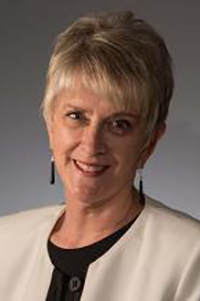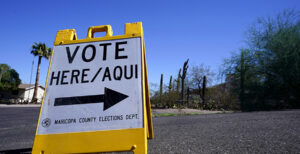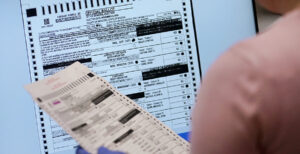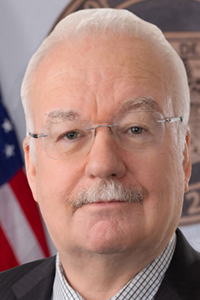An attorney for a failed candidate challenging the 2022 election results used his unrelated position as chairman of a legislative panel to elicit testimony Thursday from a former Supreme Court chief justice that ultimately could benefit his client in...
An attorney for a failed candidate challenging the 2022 election results used his unrelated position as chairman of a legislative panel to elicit testimony Thursday from a former Supreme Court chief justice that ultimately could benefit his client in court.
But the top legislative leader who appointed attorney Alexander Kolodin to head the panel, House Speaker Ben Toma, said later he sees nothing improper in his use of the role.
Kolodin is a Scottsdale Republican lawmaker and a privately hired attorney for losing GOP attorney general candidate Abe Hamadeh. Toma named him in August to head the special legislative committee looking into government censorship, big tech manipulation of internet platforms, the use of artificial intelligence, and attempts to censor social media posts.
 Ruth McGregor
Ruth McGregor
At Thursday’s committee hearing, Kolodin grilled former Arizona Supreme Court Justice Ruth McGregor on her investigation of printer failures at Maricopa County vote centers in the 2022 election Hamadeh is still challenging in court.
Kolodin told Capitol Media Services that the line of questioning fit within the charge that House Speaker Ben Toma gave the panel when he formed it the Ad Hoc Committee on Oversight, Accountability and Big Tech in August.
“All of the stuff we were talking about was with the technology, the printers and how they’re configured and is there something about them that’s causing it,” he said. “So, it’s totally a technology issue.”
Anyway, Kolodin said, the questions deal with the issue of “oversight in general.”
But Kolodin’s questions went specifically to the issues of what McGregor found after she was asked by Maricopa County to discover the cause of why tabulators at vote centers failed to read some of the ballots that had come from on-site printers. Hamadeh, who lost by 280 votes to Democrat Kris Mayes, contends those problems depressed the vote for him.
In her investigation earlier this year, McGregor said the problems of tabulators not reading ballots were the result of equipment failures and not caused by human error or an intentional act.
More to the point of Kolodin’s questions, she responded that 6% of the ballots were rejected by the tabulators. That led to confusion, angry voters and a scramble by county officials and contractors to fix the issue.
It also led to long lines at some vote centers, resulting in some people deciding to leave without casting a ballot.
 House Speaker Ben Toma, R-Peoria
House Speaker Ben Toma, R-Peoria
What makes that significant is that Hamadeh raised that issue along with others a year ago when he first filed suit in Mohave County to overturn the election. A trial judge dismissed the challenge, saying that Hamadeh’s attorneys had failed to prove their claims that he did not lose to Mayes.
Kolodin was brought in more recently to represent Hamadeh in his bid to get the state Court of Appeals to grant him a new trial where he would be able to present new evidence.
And there’s something else.
Hamadeh also has hired another attorney who last month filed a separate lawsuit asking that the race be re-run in Maricopa County based specifically on claims that county officials botched how they handled Election Day procedures.
Ryan Heath cited the problems with the printers and tabulators resulted in long lines, claiming — without citing any proof — that as many as 20% of potential voters were unable to cast their ballots. Hamadeh, has argued that Republicans overall are less likely than Democrats to vote early. Instead, they have a propensity to wait until Election Day.
And that, said Heath, means that the people turned away were more likely to be Republicans and more likely to have voted for Hamadeh than Mayes.
Toma said Thursday he sees nothing improper about Kolodin using his position as chairman of the panel to get into the issues of the 2022 election.
“This was an ad hoc interim committee that was designed to be fairly broad in scope,” the Peoria Republican told Capitol Media Services.
“It is my understanding that Rep. Kolodin asked Justice McGregor about her publicly available investigative report and whether legislative reform is necessary to prevent future printer problems in the 2024 elections,” said Toma who acknowledged he did not watch the hearing. “I have no reason to believe that anything improper occurred or will occur as a result of this hearing.”
 A sign marks the entrance to a voting precinct on the first day of early voting in the general election in Phoenix, Oct. 12, 2022. (AP Photo/Ross D. Franklin)
A sign marks the entrance to a voting precinct on the first day of early voting in the general election in Phoenix, Oct. 12, 2022. (AP Photo/Ross D. Franklin)
Kolodin did not represent Hamadeh at the initial trial in Mohave County where the candidate asked, unsuccessfully, that the results be set aside. But Kolodin does represent him now in his efforts at the Court of Appeals to get that ruling set aside so he can offer new evidence at a new trial.
He also said his representation of Hamadeh does not extend to the new lawsuit which specifically argues that the election should be re-run because of those printer issues.
A ruling in Hamadeh’s favor on the issue of Election Day problems and the resultant long lines, however, could negate the bid for a new trial. And Kolodin questioned McGregor on precisely that issue on Thursday.
“The people who left their line after an hour, they didn’t lose their vote?” he asked her.
True, she acknowledged.
“But they didn’t lose their vote because of the printer error,” McGregor told Kolodin. She pointed out that every voter whose ballot was rejected by the tabulator had the option of depositing it in a secure drawer, to be counted later at election offices.
“And it would have been counted,” McGregor said, whether by a more sensitive tabulator at the election office or, if necessary, copied onto a new ballot by election workers and then fed into the counter.
She also said that the lines at vote centers “mostly were very, very short.”
Kolodin pursued the issue.
 An election worker verifies a ballot on a screen inside the Maricopa County Recorders Office, Thursday, Nov. 10, 2022, in Phoenix. (AP Photo/Matt York)
An election worker verifies a ballot on a screen inside the Maricopa County Recorders Office, Thursday, Nov. 10, 2022, in Phoenix. (AP Photo/Matt York)
“Well, you’d agree that it’s very difficult to reassure voters of anything when they’re seeing this problem with their own two eyes, when they’re experiencing these lines, when they have to stick a ballot in a tabulator eight times before it’s accepted, it’s pretty hard to reassure those voters unless I can tell them this is how it’s going to be fixed,” he said. Kolodin said that “fix” for the 2024 election is his focus.
McGregor said, though, that poll workers already tell voters about the option of depositing the ballot into the box to have it counted later.
“Some voters don’t believe that because of the misinformation they were receiving,” she said.
The former chief justice did not spell out what that includes.
But at least part of the Election Day problems and the long lines were caused by the exhortations of Kelli Ward, then the chair of the Arizona Republican Party, who told people to vote in person versus by mail. She echoed the claims of Donald Trump and others that early voting was inherently insecure and subject to fraud.
While Kolodin said he called the hearing to look at possible legislative changes ahead of the 2024 election, he specifically inquired into whether McGregor was qualified to do the review of Election Day problems for Maricopa County in the first place — the review that found no intentional acts.
“During your time in private practice, before you were on the bench, did you ever practice election law?” he asked.
“No,” she responded.
He then asked the same question about her experience as a private attorney with cases involving printer or voting technology.
The answer was the same. And McGregor also said she could recall no case while she was on the Court of Appeals or, later, the Supreme Court, involving such technology.
She also acknowledged her inquiry was never designed to find out to what extent voters left polling places because of malfunctioning printers and long lines.
“We were conducting a very narrow, fact-specific investigation into the problems that were seen in the printers on Election Day,” McGregor said, dealing with why some of the printers put out ballots that could not be read.
The conclusion, she said, involved two factors: the use of a paper weight heavier than used in the primary and a ballot that was an inch longer than the one in the primary. That led to other problems, including the toner not being affixed to the ballots, causing them to be rejected, though she repeated that, in every case, there was an option for voters to have them tallied later.
Kolodin also questioned findings in McGregor’s report that many of the problems were specifically related to printers made by Oki, with no similar issues reported with ballots that came from printers from another manufacturer. He said the company sent a letter to the county disputing some of her findings.
McGregor questioned some of the company’s allegations. Anyway, she said, Oki’s letter did not come until after she filed her report.
Kolodin was recently placed on probation for 18 months by the State Bar of Arizona for his role in representing clients who challenged the results of the 2020 election. He agreed to the sanction to settle allegations that he pursued election cases with no merit, including claims of “massive election fraud” done “for the purpose of illegally and fraudulently manipulating the vote count to manufacture and election of Joe Biden … and down-ballot Democratic candidates.”











